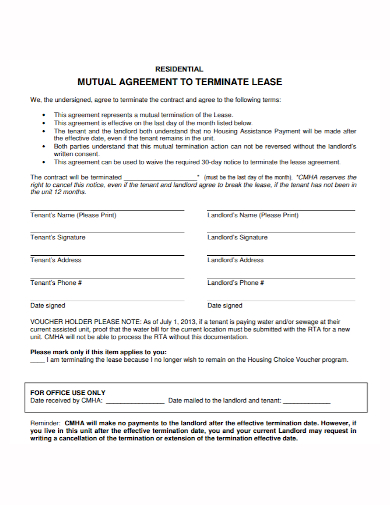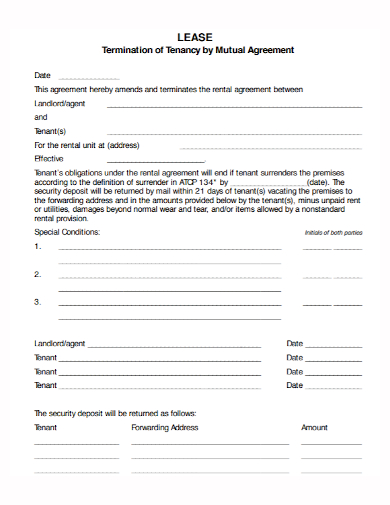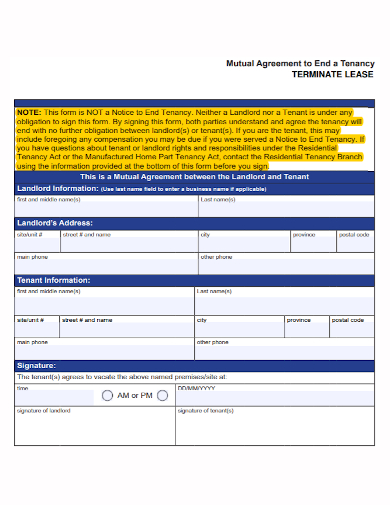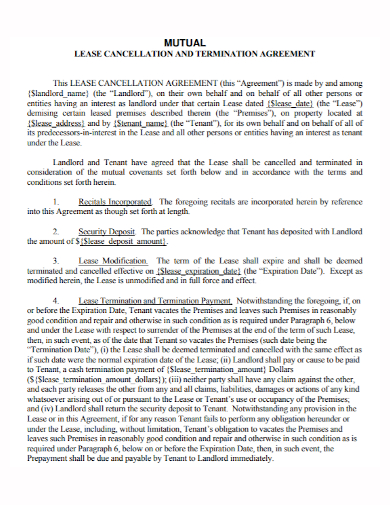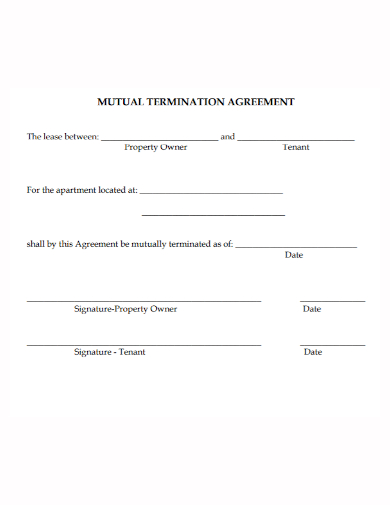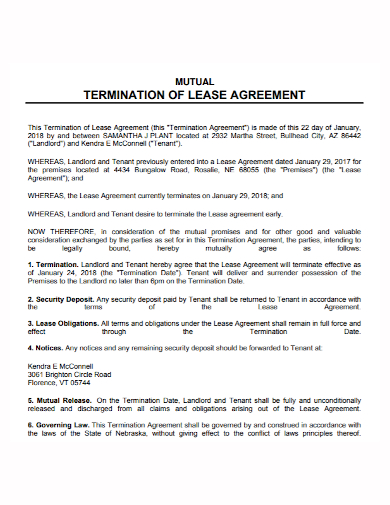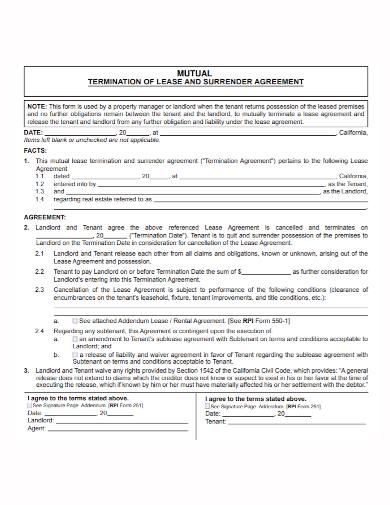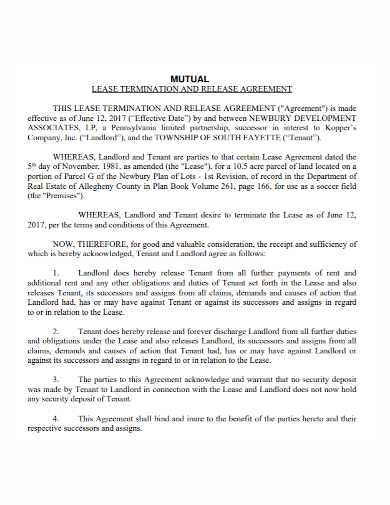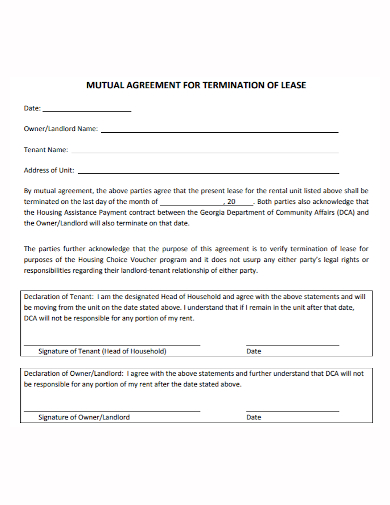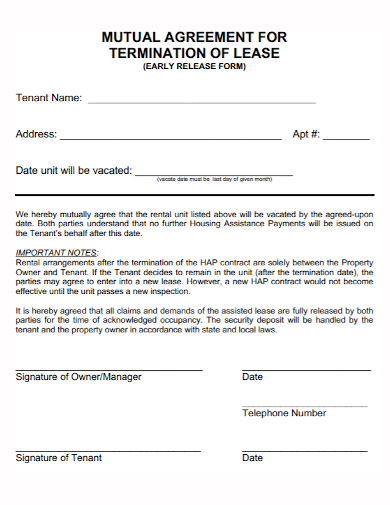Lease agreements are legally binding contracts that hold both the landlord and the tenant responsible for the terms and conditions spelled out in the contract. However, there are times when those terms may need to be changed or canceled with the consent of both parties. When landlords reach a mutual agreement to end a lease early, for example, such an agreement necessitates special documentation and handling. The Mutual Termination of Lease Tenancy form will allow for the delicate handling of a situation in which both the landlord and the tenant release each other from their lease obligations. In most cases, there is an early termination fee associated with these special circumstances.
10+ Mutual Lease Termination Agreement Samples
At any time during the lease, the landlord and tenant can mutually agree to end it. This is referred to as a mutual termination agreement. Mutual termination is a negotiated agreement that allows both parties to end the lease on mutually agreeable terms. A mutual termination is not required by either party. Both parties should benefit from the mutual termination terms. At the very least, the mutual termination agreement should specify the move-out date, what happens to the security deposit, and the amount and schedule of any money owed to one party by the other.
1. Mutual Lease Termination Agreement Template
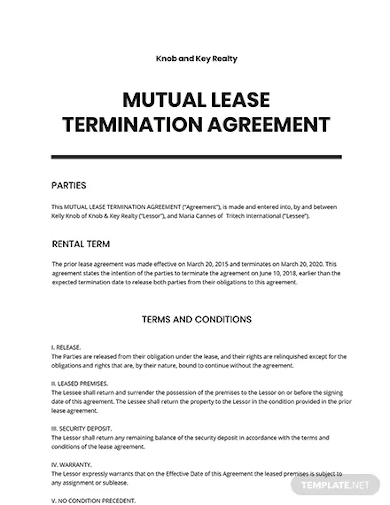
2. Residential Lease Mutual Termination Agreement
3. Mutual Lease Tenancy Termination Agreement
4. Mutual Lease Termination Agreement
5. Mutual Lease Cancellation Termination Agreement
6. Mutual Lease Property Termination Agreement
7. Sample Mutual Lease Termination Agreement
8. Mutual Lease Termination Surrender Agreement
9. Mutual Lease Termination Release Agreement
10. Mutual Agreement for Termination Lease
11. Mutual Lease Termination Agreement Form
Key Elements of a Mutual Lease Termination Agreement
While each contract is different, they must all follow the same structure. After you’ve included the required sections, you’ll need to tailor the contract to the needs of both parties as well as state laws. A standard lease termination agreement should include the following:
- Personal information—The contract should include the full names of all parties involved.
- The full address of the rented property (including city, state, and ZIP code) must be included in the agreement.
- Original rental agreement information—The landlord should provide the names of the tenants as well as the agreement’s start and end dates.
- The tenant’s exact move-out date must be specified in the contract.
- Addresses for receiving the security deposit and future notices must be provided by both parties.
- Reasons for lease termination—The agreement must state why the lease is being terminated.
Mutual termination can be beneficial to both the landlord and the tenant in the event of an eviction. The mutual termination provides a set move-out date for the tenant, avoids an eviction on the tenant’s rental history, and may keep the tenant eligible for certain rental subsidies. The mutual termination gives the landlord a set date to take possession, which may be faster than the eviction process and save the landlord money on the eviction process and hiring an attorney.
When a tenant wants to move during the term of the lease, mutual termination can be advantageous. In this case, the mutual termination provides certainty in an otherwise uncertain situation by setting a move-out date, ensuring a smooth return of the property to the landlord, and determining whether the tenant owes the landlord any money for breaking the lease early and, if so, establishing a payment schedule.
FAQs
Why do you need to hire a lawyer when drafting a contract?
One of the most reliable ways to create a mutual lease termination agreement is to use this method. Lawyers are well-versed in jargon, state laws, and potential legal issues. Mutual lease termination agreements are delicate and require as much precision as possible. Attorneys ensure that the terms of your contract accurately reflect your intentions while also being legally enforceable. The problem is that most people cannot afford a lawyer due to the high cost of their services.
What is the cheapest option to have an agreement?
Writing the contract yourself is the most cost-effective option. You are not required to use legal jargon. In court, contracts written in plain English are acceptable. Establish your conditions and adjust them to your state’s laws before you begin writing the agreement. After you’ve finished, you might want to seek legal advice. It will be less expensive, and you will have proof that you have created an enforceable document.
If you want to see more samples and formats, check out some mutual lease termination agreement samples and templates provided in the article for your reference.
Related Posts
FREE 10+ Mentoring Agreement Samples In MS Word | Apple Pages | PDF
FREE 10+ Partner Agreement Samples In MS Word | Google Docs | Apple Pages | PDF
FREE 10+ Individual Agreement Samples In MS Word | Google Docs | Apple Pages | PDF
FREE 10+ Strategic Agreement Samples In MS Word | Google Docs | Apple Pages | PDF
FREE 10+ Equity Agreement Samples In MS Word | Google Docs | Apple Pages | PDF
FREE 10+ Producer Agreement Samples in MS Word | Apple Pages | PDF
FREE 10+ Grant Agreement Samples In MS Word | Apple Pages | PDF
FREE 8+ Meeting Agreement Samples in MS Word | Google Docs | Apple Pages | PDF
FREE 10+ Community Agreement Samples In MS Word | Google Docs | PDF
FREE 8+ Real Estate Option Agreement Samples in MS Word | PDF
FREE 10+ Call Option Agreement Samples In MS Word | PDF
FREE 10+ Advertising Agreement Samples In MS Word | Google Docs | Apple Pages | PDF
FREE 10+ Car Agreement Samples In MS Word | Google Docs | Apple Pages | PDF
FREE 10+ Horse Agreement Samples In MS Word | Apple Pages | PDF
FREE 10+ Option Agreement Samples In MS Word | Google Docs | Apple Pages | PDF

